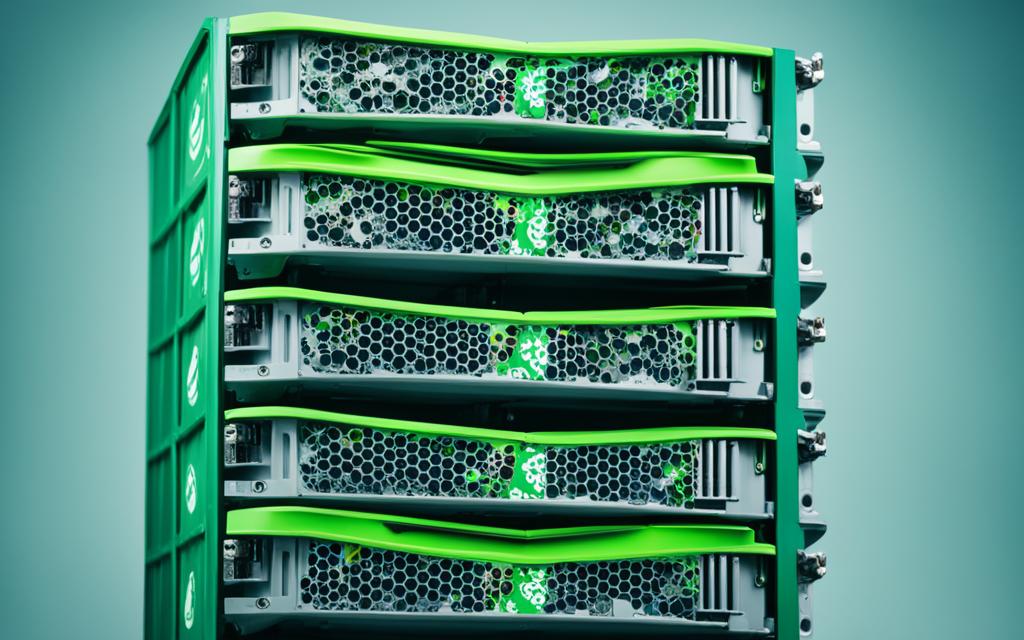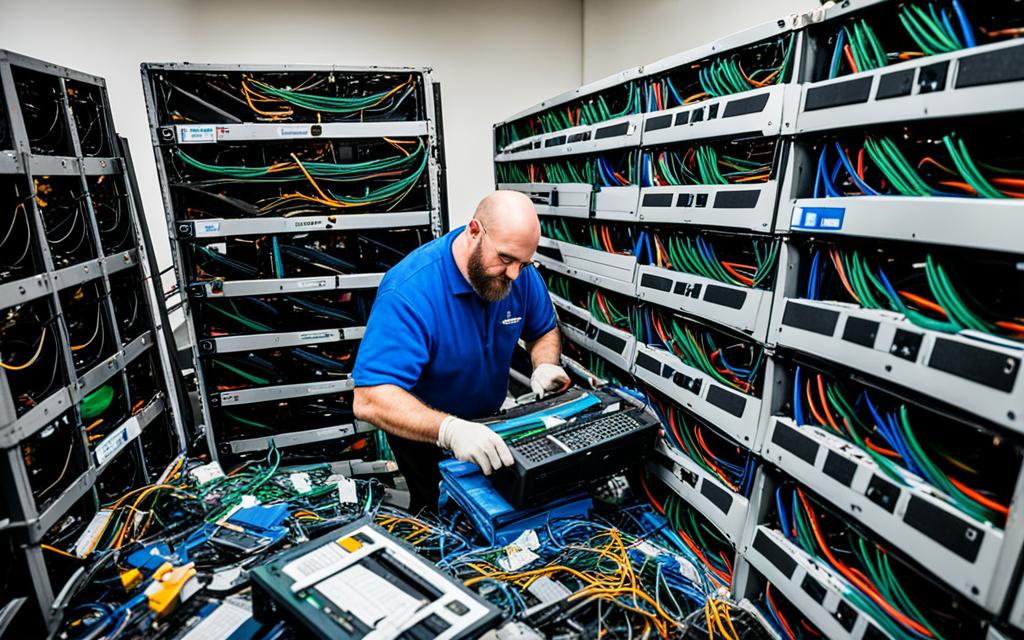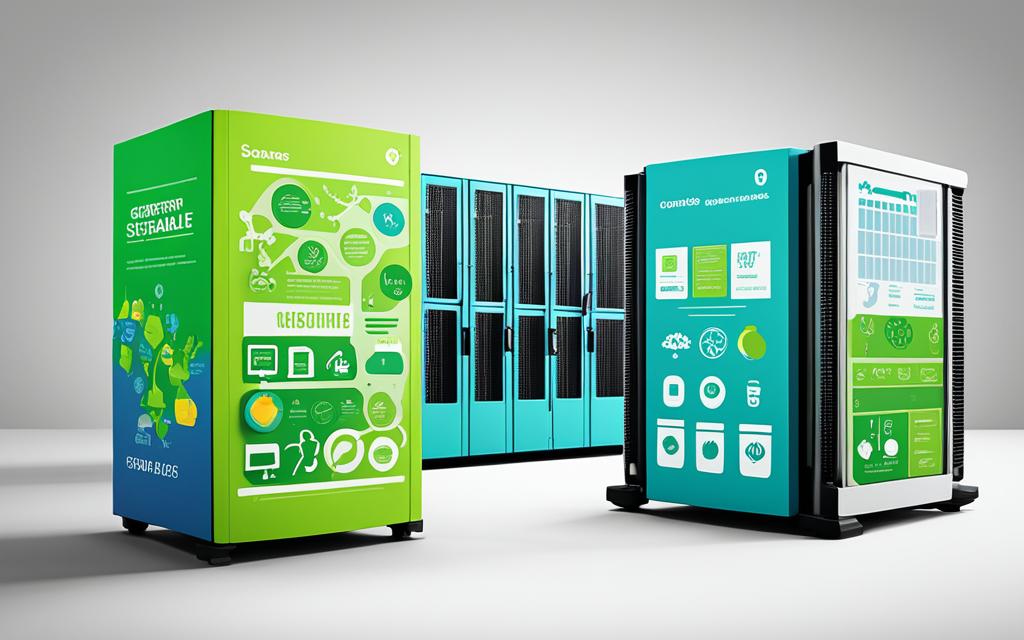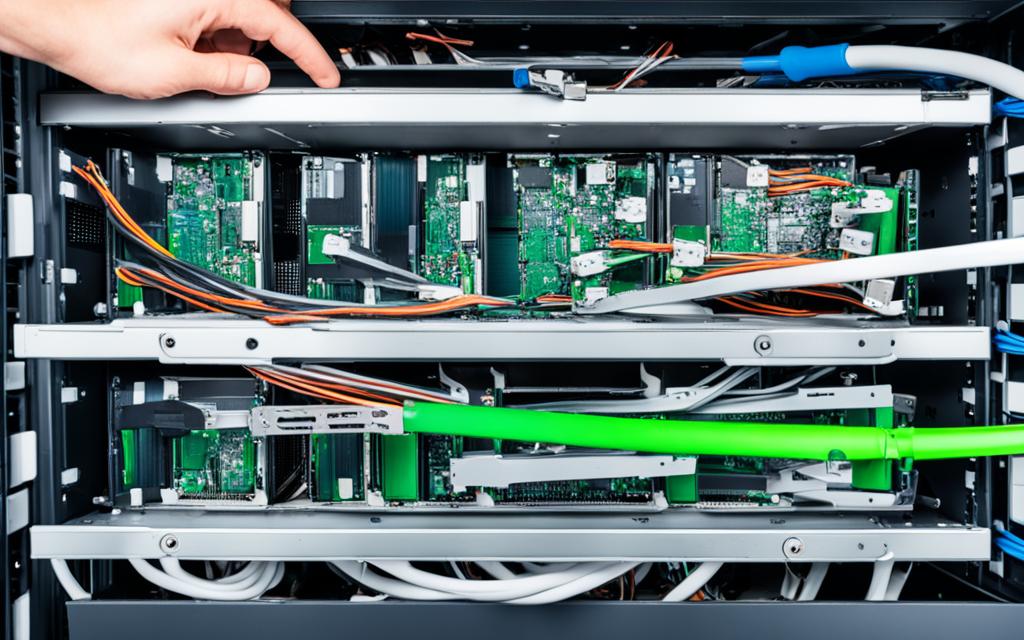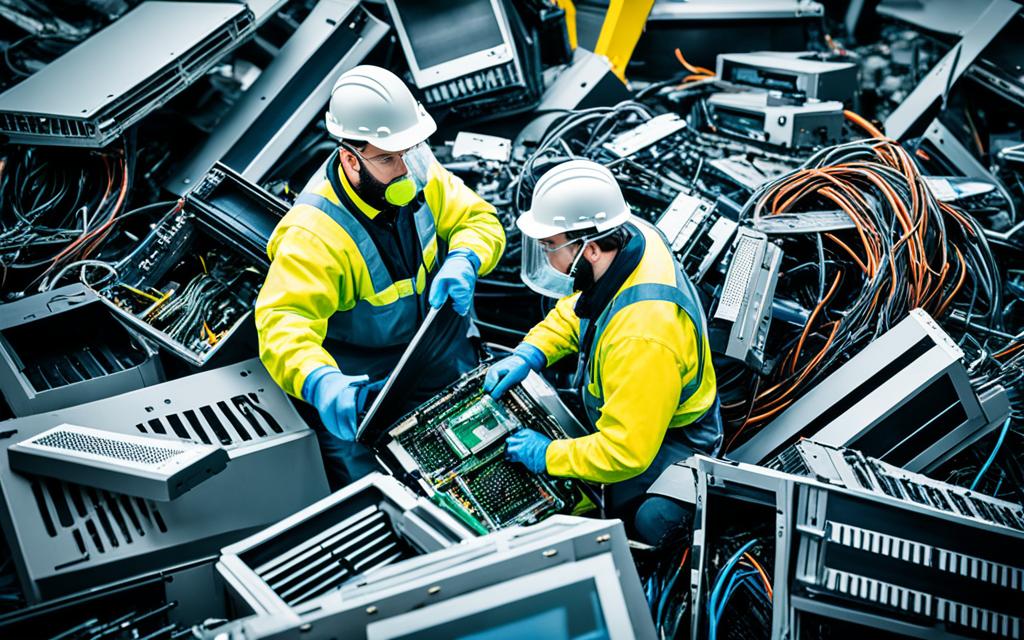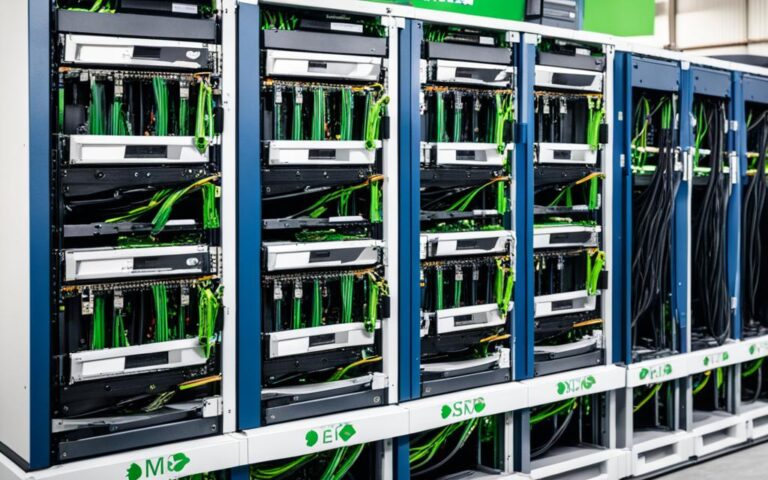The Importance of Server Recycling in Corporate Sustainability Efforts
In today’s rapidly evolving world, corporate sustainability has become a key focus for businesses seeking to make a positive impact on the environment. One crucial aspect of sustainability that often goes overlooked is corporate server recycling. By recycling servers, businesses can not only reduce their carbon footprint but also contribute to the preservation of natural resources and protect sensitive data.
Corporate server recycling encompasses various processes such as server disposal, data destruction, and regulatory compliance. By engaging in proper server recycling practices, companies prevent hazardous materials from entering the environment and conserve valuable resources. Additionally, secure data destruction techniques ensure that sensitive information stored on retired servers remains protected from unauthorized access.
To effectively address these challenges, businesses need to partner with reliable server recycling providers that understand the complexities of regulatory compliance and industry-specific requirements. This collaboration allows organizations to optimize their IT investments, improve cost efficiency, and focus on driving productivity and innovative technological solutions.
As technology continues to advance, e-waste management, including server recycling, is benefiting from technological innovations such as blockchain and artificial intelligence. These advancements enhance the transparency and accountability of the recycling process, contributing to a more sustainable approach to IT asset management.
By prioritizing server recycling in their sustainability efforts, businesses can demonstrate their commitment to environmental responsibility while positively influencing the industry as a whole. Together, let’s embrace the power of server recycling to create a more sustainable future.
Environmental Impact and Sustainability
Server recycling plays a crucial role in promoting environmental sustainability. When discarded servers and electronic equipment are not properly recycled, they can pose significant environmental hazards. These devices often contain hazardous materials that have the potential to contaminate soil, water, and air, leading to adverse effects on ecosystems and human health.
By engaging in server recycling, companies actively contribute to mitigating these environmental risks. Recycling servers ensures that hazardous substances are prevented from entering the environment, safeguarding the planet’s natural resources. Material recovery and reuse through server recycling also reduce the need for new resource extraction and energy-intensive manufacturing processes.
Proper server recycling helps conserve valuable natural resources such as minerals, metals, and fossil fuels. By recovering and reusing these resources from discarded servers, the demand for extracting new resources decreases, resulting in a more sustainable approach to resource management.
Aiming for long-term sustainability, businesses are increasingly recognizing the environmental benefits of server recycling and incorporating it into their corporate social responsibility initiatives. By diverting electronic waste from landfills and reducing the pressure on resource-intensive industries, server recycling enables organizations to make a positive impact on the environment while aligning with global sustainability goals.
Data Security and Protection
Data security is a paramount concern for businesses when disposing of servers. Improper handling of server disposal can lead to data breaches, privacy violations, and legal consequences. Secure data destruction techniques, such as secure erasure and physical destruction, ensure that sensitive information on retired servers is irretrievable, minimizing the risk of unauthorized access or data leakage.
When it comes to server disposal, data security should be the top priority. Every business deals with confidential information that, if compromised, can have severe consequences. Whether it’s customer data, intellectual property, or financial records, proper measures must be taken to protect this information.
One of the most effective ways to ensure data security during server disposal is through secure data destruction techniques. This involves completely wiping out all data from the servers, leaving no trace behind. Secure erasure techniques use advanced software algorithms to overwrite the data multiple times, making it virtually impossible to recover.
In addition to secure erasure, physical destruction can be employed for an extra layer of security. Physically destroying the servers ensures that the data is completely destroyed and cannot be accessed by anyone. This can be done through methods such as shredding or crushing the servers into small pieces.
Secure Erasure Techniques
- Securely overwriting the data multiple times using advanced algorithms.
- Verification of the erasure process to ensure its effectiveness.
- Certification or audit trail to provide proof of proper data destruction.
Physical Destruction Methods
- Shredding the servers into small pieces.
- Crushing the servers to render them completely unusable.
- Disassembling the servers and destroying individual components.
Proper data destruction techniques, such as secure erasure and physical destruction, provide businesses with the peace of mind that their sensitive information is secure even after server disposal. By taking the necessary steps to ensure data security, businesses can mitigate the risk of data breaches and protect their reputation.
It is important for businesses to partner with reputable server disposal service providers who are experienced in data security and destruction. These providers can offer secure and certified solutions that comply with industry standards and regulations.
By prioritizing data security during server disposal, businesses can safeguard their sensitive information, protect their customers’ data, and maintain compliance with data protection regulations.
Regulatory Compliance and Industry-Specific Requirements
Complying with regulations and adhering to industry-specific requirements is imperative for businesses involved in server recycling and IT asset management. Failure to meet these standards can result in severe consequences such as fines, penalties, and damage to reputation. To ensure compliance, it is crucial for businesses to partner with a reliable server recycling provider that understands and meets the necessary regulatory and industry requirements.
Expertise in regulatory compliance enables businesses to navigate the complexities of server disposal and mitigate potential risks effectively. By working with a knowledgeable and experienced provider, businesses can remain up-to-date with the ever-changing regulatory landscape and ensure that their server recycling practices align with current standards.
When it comes to regulatory compliance and industry-specific requirements, one size does not fit all. Different sectors and industries have unique demands that need to be met when it comes to server recycling. These requirements can vary in terms of data security protocols, documentation, certifications, and environmental standards.
For instance, the healthcare industry has stringent regulations safeguarding patient privacy and data security, including the Health Insurance Portability and Accountability Act (HIPAA). Organizations within the financial sector must adhere to regulations such as the Payment Card Industry Data Security Standard (PCI DSS). Similarly, other industries have their own set of compliance requirements tailored to their specific needs.
Examples of industry-specific requirements:
- Certifications and standards related to data security and privacy
- Documentation and reporting obligations
- Environmental sustainability guidelines
- Asset disposal and data destruction protocols
- Procedures for handling hazardous materials
By partnering with a server recycling provider that specializes in their industry, businesses can ensure that their server disposal and IT asset management processes align with the specific requirements of their sector. This collaboration minimizes the risk of non-compliance and helps build trust among customers, stakeholders, and regulatory bodies.
Benefits of complying with regulatory compliance and industry-specific requirements:
- Avoiding penalties and fines
- Protecting sensitive data and ensuring data privacy
- Maintaining a positive reputation and brand image
- Meeting customer expectations for ethical and responsible practices
- Complying with environmental standards and contributing to sustainability efforts
Through a diligent focus on regulatory compliance and industry-specific requirements, businesses can operate responsibly, protect sensitive information, and contribute to a sustainable future.
Optimizing IT Investments and Cost Efficiency
Recycling servers plays a crucial role in optimizing IT investments and improving cost efficiency for businesses. Outdated or underutilized servers not only take up valuable space but also require maintenance and can become financial burdens. By embracing server recycling, businesses can unlock multiple benefits that lead to long-term financial savings and operational efficiency.
One of the significant advantages of server recycling is freeing up physical space within the organization. Unused server hardware can occupy valuable square footage in data centers or office spaces. By responsibly disposing of these servers, businesses can create more room for essential operational activities, expansion, or future investments. Furthermore, a reduced physical footprint can also translate into lower facility costs or potential revenue-generating opportunities.
The cost savings associated with server recycling extend beyond physical space. Outdated servers often require regular maintenance, replacement parts, and software upgrades to ensure their performance and security. These expenses can accumulate over time, draining financial resources that could be allocated towards more strategic IT initiatives.
By recycling servers, businesses can eliminate unnecessary costs associated with storing and maintaining outdated hardware. These cost savings can then be redirected towards critical areas, such as investing in new technologies or enhancing cybersecurity measures. Not only does this optimize IT investments, but it also equips organizations with the necessary resources to stay agile, competitive, and future-ready in today’s rapidly evolving digital landscape.
Key Benefits:
- Cost savings: Server recycling reduces expenses related to maintenance, upgrades, and replacement parts.
- Enhanced resource allocation: Freed-up financial resources can be redirected towards strategic initiatives and technology upgrades.
- Improved efficiency: Reduced physical footprint allows for better space utilization and optimized workflows.
- Sustainable practices: Server recycling aligns with environmental initiatives, promoting corporate social responsibility.
In summary, server recycling enables businesses to optimize their IT investments, enhance cost efficiency, and embrace sustainable practices. By freeing up physical space, reducing maintenance costs, and reallocating resources strategically, organizations can unlock significant financial benefits and drive innovation in a highly competitive digital landscape.
Technological Innovations in E-Waste Management
Technological advancements have transformed the landscape of e-waste management, bringing about significant improvements in server recycling processes. One notable innovation is the implementation of blockchain technology, which enables the transparent tracking of e-waste throughout its entire lifecycle. By leveraging blockchain, it becomes possible to ensure transparency and accountability at every stage, from collection to final recycling.
In addition to blockchain, automated sorting systems powered by artificial intelligence (AI) have emerged as game-changers in the recycling industry. These advanced systems streamline the process of separating different components of electronic devices, allowing for efficient and precise recycling. By harnessing the power of AI, e-waste management is now more accurate and effective, contributing to a more sustainable approach to IT asset management.
Furthermore, these technological innovations not only enhance the recycling process but also aid in the proper handling of electronic devices. With improved accuracy and efficiency, the risk of hazardous materials entering the environment is significantly reduced. By ensuring the proper disposal of e-waste, businesses and individuals can actively contribute to the sustainable management of IT assets and minimize the environmental impact caused by improper disposal.
FAQ
What is server recycling and why is it important for corporate sustainability efforts?
Server recycling encompasses server disposal, data destruction, environmental impact, regulatory compliance, and data security. It is crucial for corporate sustainability efforts as it prevents hazardous materials from entering the environment, conserves natural resources, protects sensitive data, ensures regulatory compliance, and optimizes IT investments.
What is the environmental impact of server recycling?
Server recycling significantly contributes to environmental sustainability. Improperly recycled servers and electronic equipment can pose environmental hazards by contaminating soil, water, and air. Recycling servers prevents these substances from entering the environment, conserves natural resources through material recovery and reuse, and reduces the need for new resource extraction and energy-intensive manufacturing processes.
How does server recycling address data security concerns?
Proper server recycling includes secure data destruction techniques like secure erasure and physical destruction. These techniques ensure that sensitive information on retired servers is irretrievable, minimizing the risk of data breaches, privacy violations, and legal consequences.
Why is regulatory compliance important in server recycling?
Businesses must comply with various regulations and industry-specific requirements related to server recycling and IT asset management. Non-compliance can result in fines, penalties, and reputational damage. Partnering with a reliable server recycling provider ensures compliance with regulations and industry standards, helping businesses navigate complexities and mitigate risks.
How does server recycling optimize IT investments and improve cost efficiency?
Recycling servers allows businesses to free up physical space, reduce maintenance expenses, and eliminate unnecessary costs associated with storing and maintaining outdated hardware. This optimization of IT investments enables organizations to allocate resources effectively and focus on technologies that drive productivity and innovation.
What technological innovations are transforming e-waste management and server recycling?
Technological advancements like blockchain and artificial intelligence have revolutionized e-waste management, including server recycling. Blockchain technology enables tracking of e-waste throughout its lifecycle, improving transparency and accountability. Automated sorting systems powered by artificial intelligence streamline the recycling process, contributing to a more sustainable approach to IT asset management.

